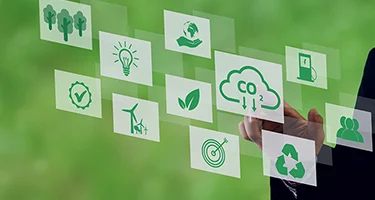Q8 for Sustainability
To actively contribute to a sustainable future, Q8 has extensively integrated sustainability into all its activities.
In line with ESG (Environmental, Social and Governance) issues, there are three pillars on which the sustainability strategy is articulated, which is combined with 10 of the 17 Sustainable Development Goals (SDGs).
Governance Area
The first pillar is "New Way of Doing Business", representing Q8's idea of its business: ethical, capable of creating long-term value, and giving ample space to digitalization and technology. To this first pillar, the following SDGs have been associated:
 SDG 8: Decent Work and Economic Growth
SDG 8: Decent Work and Economic Growth
 SDG 9: Industry, Innovation, and Infrastructure
SDG 9: Industry, Innovation, and Infrastructure
 SDG 16: Peace, Justice, and Strong Institutions
SDG 16: Peace, Justice, and Strong Institutions
 SDG 17: Partnerships for the Goals
SDG 17: Partnerships for the Goals
- The Company ensures a transparent and effective governance system, composed of the Board of Directors and internal Committees, with the aim of creating wealth for itself and its stakeholders throughout the value chain.
- At the core of the company's strategies lies risk analysis, aimed at assessing business-related risks, including those in sustainability.
- Q8 is committed to always complying with laws, regulations, and other applicable requirements.
- Q8 manages all operations in line with the principles and criteria of ethical, social, and environmental responsibility.
- Q8 is committed to transmitting its values to internal and external stakeholders in terms of ethics, transparency, and the protection of people and the environment in which it operates.
- Innovation and Digital Transformation are fundamental drivers of the Company's operational strategies.
- Energy Transition, innovation, and Digital Transformation are fundamental drivers of the Company's operational strategies.
Environmental Area
The pillar "Enabler for Energy Transition" represents Q8’s commitment to researching new sustainable and green solutions capable of reducing CO2 emissions, experimenting with alternative forms of energy, and increasing energy efficiency applied to innovative and accountable infrastructures. Therefore, the associated SDGs are:
 SDG 7: Affordable and Clean Energy
SDG 7: Affordable and Clean Energy
 SDG 9: Industry, Innovation, and Infrastructure
SDG 9: Industry, Innovation, and Infrastructure
 SDG 11: Sustainable Cities and Communities
SDG 11: Sustainable Cities and Communities
 SDG 13: Climate Action
SDG 13: Climate Action
In line with the fundamentals of sustainable development, while respecting and protecting the rights of communities and future generations, the Company commits to minimizing and optimizing the impact of its business activities on the environment and encourages its stakeholders to adopt the same behavior.
The Company pledges to ensure, among other things:
- Health and safety of workers;
- Accountable resource management;
- Reduction of GHG emissions generated directly from sources owned or controlled by the Company or indirectly from purchased and consumed energy;
- reduction and optimization of material usage;
- reduction of consumption and promotion of projects aimed at using recycled materials from a circular economy perspective;
- waste production containment, selective waste collection to favor recycling, and reduction in landfill disposal quantities;
- use of energy from renewable sources where possible;
- promotion of alternative fuels to end customers.
Social Area
The pillar "People Enhancement" encompasses Q8's commitment to its employees, collaborators, customers, and the community in which the Company operates. The associated SDGs are as follows:
 SDG 3: Good health and well-being
SDG 3: Good health and well-being
 SDG 4: Quality Education
SDG 4: Quality Education
 SDG 5: Gender Equality
SDG 5: Gender Equality
 SDG 8: Decent Work and Economic Growth
SDG 8: Decent Work and Economic Growth
 SDG 17: Partnerships for the Goals
SDG 17: Partnerships for the Goals
-
In addition to ensuring respect for human rights, Q8 promotes, both internally and externally, the fundamentals of inclusion, diversity, multiculturalism, and heterogeneity.
The Company is committed to ensuring that its employees receive advanced welfare forms, merit-based benefits, and continuous training, including in ESG areas.
Beyond the company’s perimeter, Q8 is engaged in creating social value, playing a role in cultural stimulation, and supporting the territory and communities in which it operates, demonstrating its commitment to corporate social responsibility (CSR).
The Company considers its customers crucial and commits to managing their needs effectively and satisfactorily, raising awareness, and involving them in CSR initiatives.
The fundamentals of collaboration, fairness, and transparency underlie the relationships that the Company maintains with its partners, stakeholders, and the territories in which it operates, encouraging constant dialog to raise awareness among all parties involved on social and environmental responsibility issues
Contacts
If you have any questions about this document, please contact the External Relations, Press and CSR Service at the following e-mail address: relazioniesterne@Q8.it
Download the document





 SDG 8:
SDG 8:  SDG 9:
SDG 9:  SDG 16:
SDG 16:  SDG 17:
SDG 17:  SDG 7:
SDG 7:  SDG 11:
SDG 11: SDG 13:
SDG 13:  SDG 3:
SDG 3:  SDG 4:
SDG 4:  SDG 5:
SDG 5: